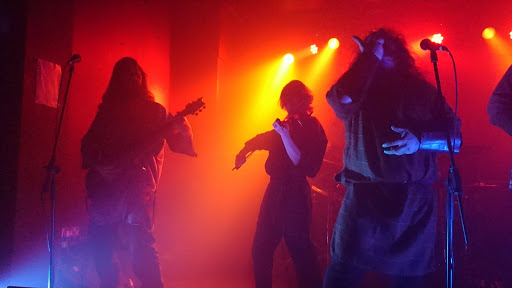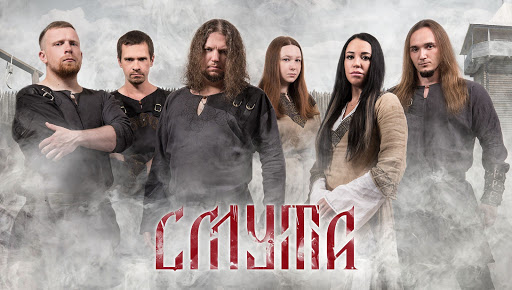Yhandros Huergo, (Cuélebre, Spain)
Pagan folk live in ancient Iberia. He is personified in the band Cuélebre, which preserves its cultural heritage. We talked to these days with Yhandros, about the band’s future plans...
1. Hello Yhandros, our collaboration started back in 2015, when we did our first interview and review of the Oinos album. What has changed in the band so far?
Yhandros: Hello Predrag, the truth is that many things have changed in the band since then, "Oinos" was the band's first album, we have had many shows and that entails many changes in the line-up due to many factors, personal problems and different visions. of the project. Fortunately we have been with a stable training for more than two years and in which we all look towards the same goal, making music and enjoying the good times.
Hola Predrag, la verdad es que muchas cosas han cambiado en la banda desde entonces, "Oinos" fue el primer disco de la banda, hemos tenido muchos shows y eso conlleva muchos cambios en la formación debido a muchos factores, problemas personales y diferentes visiones del proyecto. Afortunadamente llevamos más de dos años con una formación estable y en la que todos miramos hacia un mismo objetivo, hacer música y disfrutar de los buenos momentos.
2. Last album "Dijara " was well received by the audience, which was to be expected. How are you satisfied with him?
Yhandros: I'm very happy with "Dijara", Not only for the reception of the audience, which has been great, but also because of the involvement of all the members of the band when it comes to contributing their talent to make the best album possible. On a personal level, I think that stopping doing shows to focus only on the album was something that helped a lot for the result to be very good both in sound and in compositions.
Estoy muy contento con "Dijara", no solo por la acogida del público, que ha sido genial, sino también por la implicación de todos los integrantes de la banda a la hora de aportar su talento para hacer el mejor disco posible. A nivel personal creo que dejar de hacer shows para centrarme solo en el disco fue algo que ayudó mucho a que el resultado fuera muy bueno tanto en sonido como en composiciones.
3. You often collaborate with other artists (Arnica, Urze de Lume, Drusuna, Trobar de Morte, Mileth, etc). What are your experiences of these cooperations? Will You continue to explore music with other musicians and artists that you'll be sharing the listeners?
Yhandros: Many of these collaborations are reduced simply to sharing the stage with some of them in very specific moments. It's always good to listen to and learn from other musicians, and if it's live, even better! On our last album we have had the honor of doing a song with Neonymus and it has been a great experience. With Drusuna we have not yet had the luck to coincide, but I hope it happens soon. And I think we can convince Mileth of a collaboration on some song. On the other hand, and due to the covid crisis, some musicians from different bands that usually perform at Castlefest have been collaborating on some songs, but I don't know when we will be able to hear those songs.
Muchas de estas colaboraciones se reducen simplemente a compartir escenario con algunos de ellos en momentos muy concretos. Siempre es bueno escuchar y aprender de otros músicos, y si es en vivo, ¡incluso mejor! En nuestro último disco hemos tenido el honor de hacer una canción con Neonymus y ha sido una gran experiencia. Con Drusuna todavía no hemos tenido la suerte de coincidir, pero espero que suceda pronto. Y creo que podemos convencer a Mileth de una colaboración en alguna canción. Por otro lado, y debido a la crisis del covid, algunos músicos de diferentes bandas que suelen actuar en Castlefest han estado colaborando en algunas canciones, pero no sé cuándo podremos escuchar esas canciones.
4. In the meantime, you also performed at a prestigious festival, Castefest. What experiences do you bring from those guest appearances?
Yhandros: Great experiencies, it's amazing the atmosphere that you feel in the festival is incredible, from the organization to the audience, the rest of the bands, friends ... it is difficult to explain everything in words.
Grandes experiencias, el ambiente que se respira durante todo el festival es increíble, desde la organización hasta el público, el resto de bandas, amigos ... es difícil explicar todo con palabras.
5. What is the music for you ? In which way music defines you?
Yhandros: I started playing instruments at 8 years old, at 9 I gave my first concert, except for some time that I have focused more on other things, I have always had music in mind and heart. And it defines me in the fact that a large part of my daily time is dedicated to music, either playing or listening to other bands. I don't like to analyze the music of others, only if they make me feel something inside me or not. When I compose it's the same, I need the song to catch me, I don't care if it's more or less complex.
Empecé a tocar instrumentos a los 8 años, a los 9 di mi primer concierto, salvo alguna vez que me he centrado más en otras cosas, siempre he tenido la música en mente y corazón. Y me define en el hecho de que gran parte de mi tiempo diario lo dedico a la música, ya sea tocando o escuchando otras bandas. No me gusta analizar la música de los demás, solo si me hacen sentir algo dentro de mí o no. Cuando compongo es lo mismo, necesito que la canción me atrape, no me importa si es más o menos compleja.
6. Plans for future?
Yhandros: With the covid crisis, many festivals and dates that we had to present "Dijara" have fallen. If all goes well in November we will be in Netherlands accompanying Nytt Land and Cesair and we will probably take advantage of the trip to give another show in another country (from Spain to Netherlands it is approximately 1600 km of road, we can think about what to do on the way). Given the lack of shows, I have continued to compose some more songs, I don't know if they will all end on a Cuelebre album or if some will be the seed for another project.
Con la crisis del covid han caído muchos festivales y fechas que teníamos para presentar "Dijara". Si todo va bien en noviembre estaremos en Holanda acompañando a Nytt Land y Cesair y probablemente aprovecharemos el viaje para dar otro espectáculo en otro país (de España a Holanda son aproximadamente 1600 km de carretera, podemos pensar en qué hacer en el camino). Ante la falta de shows he seguido componiendo algunas canciones más, no sé si terminarán todas en un disco de Cuelebre o si alguna será semilla para otro proyecto.
7. A concert in Serbia, perhaps?
Yhandros: Hopefully I love the road, playing music and meeting new places and people, so I think all the ingredients are ready, you just need a little luck and the time is right.
Con suerte, me encanta la carretera, tocar música y conocer nuevos lugares y personas, así que creo que todos los ingredientes están listos, solo necesitas un poco de suerte y es el momento adecuado.
8. And in the end what will you tell readers in Serbia?
Yhandros: First of all, thank you very much for reading the entire interview. I love reading about the mythology of all places, Serbia has fascinating stories, Kraljević Marko and Miloš Obilić are truly epic figures, Dragan Bibin's paintings are dark and magnificent. You really have a fascinating story, take care of it, because knowing about the past allows us not to repeat mistakes in the future.
Primero de todo, si has leido hasta aqui, muchas gracias. Me encanta leer sobre la mitología de todos los lugares, Serbia tiene historias fascinantes, Kraljević Marko y Miloš Obilić son figuras realmente epicas, las pinturas de Dragan Bibin son oscuras y magnificas. Realmente teneís una historia fascinante, cuidarla, porque saber del pasado nos permite no repetir errores en el futuro.
Made by: Predrag G.
























